Yarl's Wood detention centre 'is a prison'
- Published
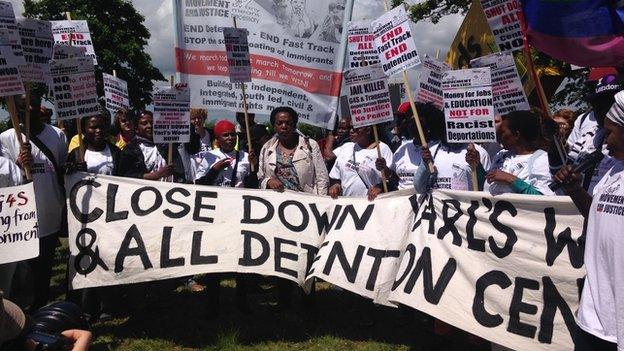
Hundreds of protesters held a demonstration outside the Yarl's Wood detention centre on Saturday, calling for its immediate closure.
Activists, politicians and actors were joined by women who had spent time at the notorious Bedfordshire centre, where foreign nationals are detained before their removal from the UK.
"Detention centres will fall, brick by brick, wall by wall," chanted some 400 protesters outside Yarl's Wood.
"When I say to people I was detained for five months they say, 'What! Why?' But I say I'm lucky because there are some people who have been detained for more than two years," says Maimuna Jawo from Gambia, addressing the crowd.
"Yarl's Wood is a prison but asylum seekers are not criminals."
Yarl's Wood is the main removal centre holding 400 women who are under threat of deportation. Until 2010, about 1,000 children were also detained there but then the family wing closed down.
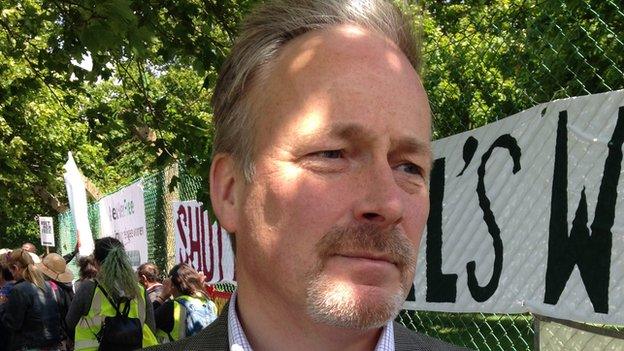
Richard Fuller MP says there are alternatives to detention centres
Conservative MP for Bedford and Kempston, Richard Fuller, joined the protest and said the detention of asylum seekers had to stop.
"There must be no more detention of pregnant women or victims of torture and rape," he said.
A petition calling for a debate in Parliament to end immigration detention has now attracted more than 100,000 signatures.
"Detention used to be something that was used as an exception but over the decades it became the default position," he said.
"There's no inconsistency with wanting tough immigration rules, which I do, but also being strong about our values as British citizens."
'Poisonous institutions'
Maimuna Jawo says she escaped to the UK in 2009 because her mother performed female genital mutilation and when she died, the community wanted her to carry on the tradition, which she did not want to do.
"I was threatened by my elders. If I say no I'm saying no to our traditional culture and that's a taboo. They might kill me for refusing."
She explains that she came to the UK legally but then overstayed. She says she moved around Birmingham and London sleeping in mosques, until eventually she was taken in by a family.
She claimed asylum in 2012 but was told after her first interview they would not accept her case, and she was taken to Yarl's Wood.
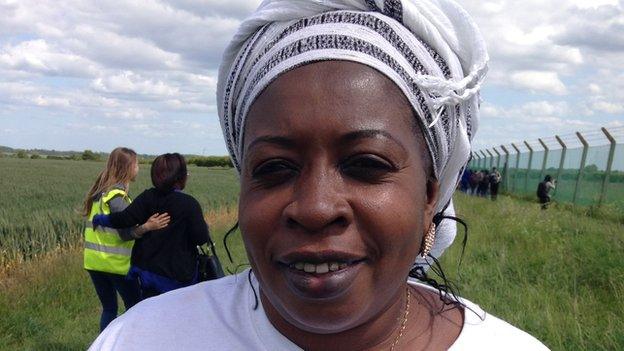
Maimuna Jawo is awaiting deportation
"They took my phone away from me and when I saw the officer with his bunch of keys, that's when I realised I was in prison."
She says she had no access to a lawyer and despite her poor English, she was refused an interpreter. She managed to call the family she had been staying with, who raised money for a solicitor for her appeal.
"But I wasn't able to see that solicitor until the day of my hearing and I had no interpreter, so I didn't have the chance to explain my case to her."
Her appeal was denied and her deportation is imminent, although she is no longer being detained in Yarl's Wood.
It is stories like this which has drawn actress Juliet Stevenson to join the demonstration.
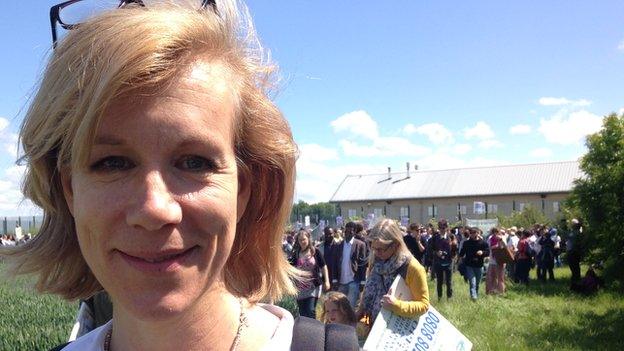
Actress Juliet Stevenson has been inside Yarl's Wood
"They really are poisonous institutions so they should shut. It's a cross-party issue and I think if people came and saw what went on inside them, most people in this country would probably feel the same way," she says.
The actress, who has starred in films such as Bend it like Beckham and Truly, Madly, Deeply, visited Yarl's Wood eight years ago to meet the women and children who were held there.
"I was so shocked. It's like a secret Britain, this is a sort of undercover Britain that people really don't know about.
"There's women locked in there who can't get out, can't even open a window and they've come to this country seeking asylum having been tortured in their countries of origin."
Stevenson says it is like a prison, only worse because they do not have the right to legal representation and they do not have citizenship, which prisoners have.
"And of course they haven't committed any crime," she adds.
'More effective'
Lydia Byson, 43, says coming to Yarl's Wood brings back bad memories as she was detained there twice.
"The first time for a month and the second time for two weeks," she says.
"I think they released me because I was running a campaign and I had a lot of media attention. Many have been deported without exhausting their asylum claim and no-one even knows about them."
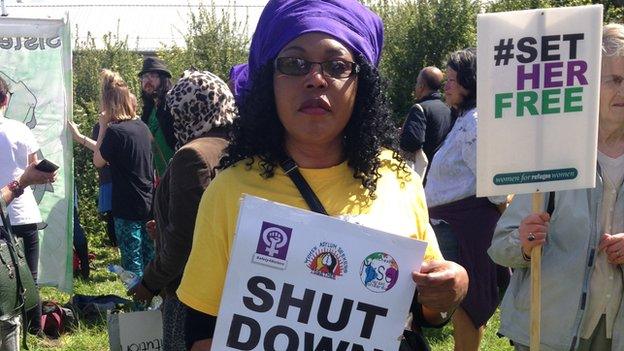
Lydia Byson has been allowed to say in the UK - six years after arriving here
Ms Byson says she fled Cameroon in December 2006 - she is from the English speaking part of the country, persecuted by the French-speaking majority.
"I was a member of the political group campaigning for rights. I was imprisoned once and then before I was to going be imprisoned again I fled because sometimes you get imprisoned indefinitely."
"I think it's the nature of the system, as soon as they hear you are an asylum seeker they don't believe you. So my asylum claim was turned down a couple of times, until in 2012 I was recognised as a refugee."
Yarl's Wood was back in the headlines recently after Channel 4 broadcast undercover footage showing staff referring to the inmates as "animals".
Serco, which runs the centre, has appointed a barrister to carry out an independent review of its work and has said it will "not tolerate poor conduct or disrespect and will take disciplinary action wherever appropriate".
The home secretary has commissioned an independent review of detainee's welfare.
Following the suspension of two staff members at the centre in the wake of the allegations, Home Office Minister Karen Bradley described the situation as "deeply concerning" and said: "A sense of fairness must always be at the heart of our immigration system, including for those we are removing from the UK."
She also said officials had visited Yarl's Wood to ensure all detainees were being treated in a "safe and dignified manner".
Mr Fuller says there are alternatives to detention.
"It's much more effective to manage people in the community," he said
"There's much higher levels of compliance, it costs less money."
- Published4 March 2015
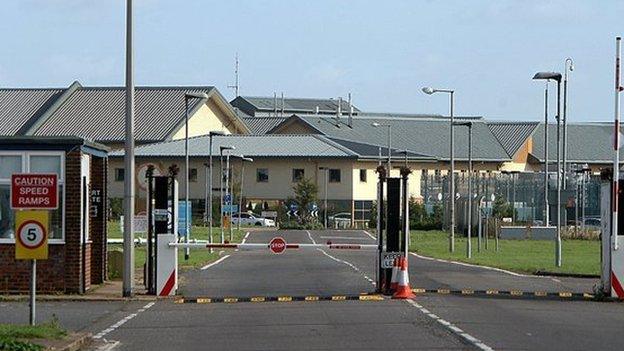
- Published3 March 2015
